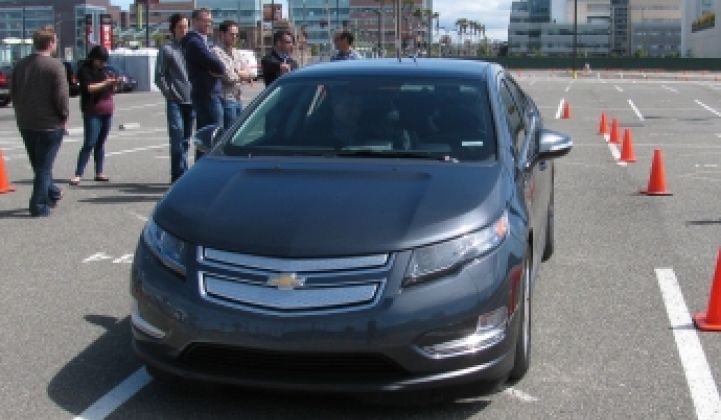Fresh out of bankruptcy, General Motors promises its plug-in hybrid, the Chevy Volt, will go on sale in late 2010. What else does GM want to tell the world about it?
Jon Lauckner, Volt co-creator and GM's vice president of global program management, didn't offer too many hard answers to the dozens of questions he fielded in an online question-and-answer session Wednesday.
But he did clarify some roads the Volt wasn't planning to travel down.
For example, GM doesn't plan to lease the Volt's batteries to customers, he wrote. That's a business model being considered by some, including battery charging and swapping station startup Better Place, since batteries can make up a significant portion of the cost of plug-in hybrid or pure electric vehicles (see Green Light post).
Neither does GM intend to make the Volt's batteries easily removed and exchanged, Lauckner wrote. That means the Volt will not be a candidate for Better Place's switch-the-battery business model – not surprising, since Better Place is aiming more at serving all-electric vehicles (see Better Place Demonstrates Battery Swapping Stations).
The Volt's battery pack – being designed by GM with battery cells from a consortium headed by LG Chem – is expected to retain enough of a charge to deliver 40 miles of electric-powered range over 10 years and 150,000 miles of service, Lauckner wrote. GM will guarantee that performance and repair or replace batteries that don't meet it, he wrote.
Afterwards, the battery packs should have enough energy storage capacity for stationary applications, he added – a nod to the concept that semi-depleted car batteries could find second homes storing energy at homes, businesses or utility substations (see Green Light post).
GM still isn't talking about a price for the Volt, and likely won't until three to six months before it starts production, Lauckner wrote.
The European version of the Volt, the Ampera, is still on track for a 2011 launch, but GM will also sell the regular Volt in Europe, Lauckner wrote. That was in response to a question about the future of Opel, GM's troubled European division (see recent Bloomberg article).
And GM doesn't see much point in putting solar panels on the roof of the Volt, Lauckner wrote – unlike Toyota, which will offer buyers of the new Prius hybrid the option of rooftop solar panels made by Kyocera (see Green Light post).
"The amount of solar energy you can get by covering the Volt's roof with solar cells is only enough to run a small fan motor," he wrote. "You aren't going to recharge the battery on solar power in a reasonable amount of time."
Toyota expects to start mass-producing a plug-in version of the Prius in 2012 (see Green Light post).
Image of the Chevy Volt courtesy General Motors



